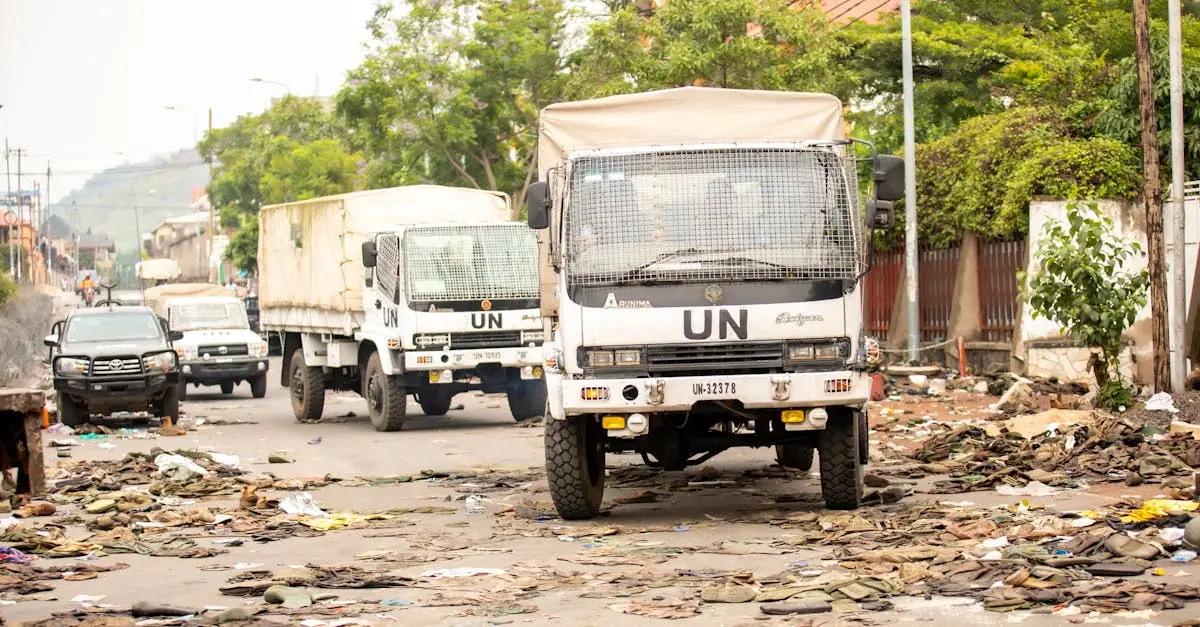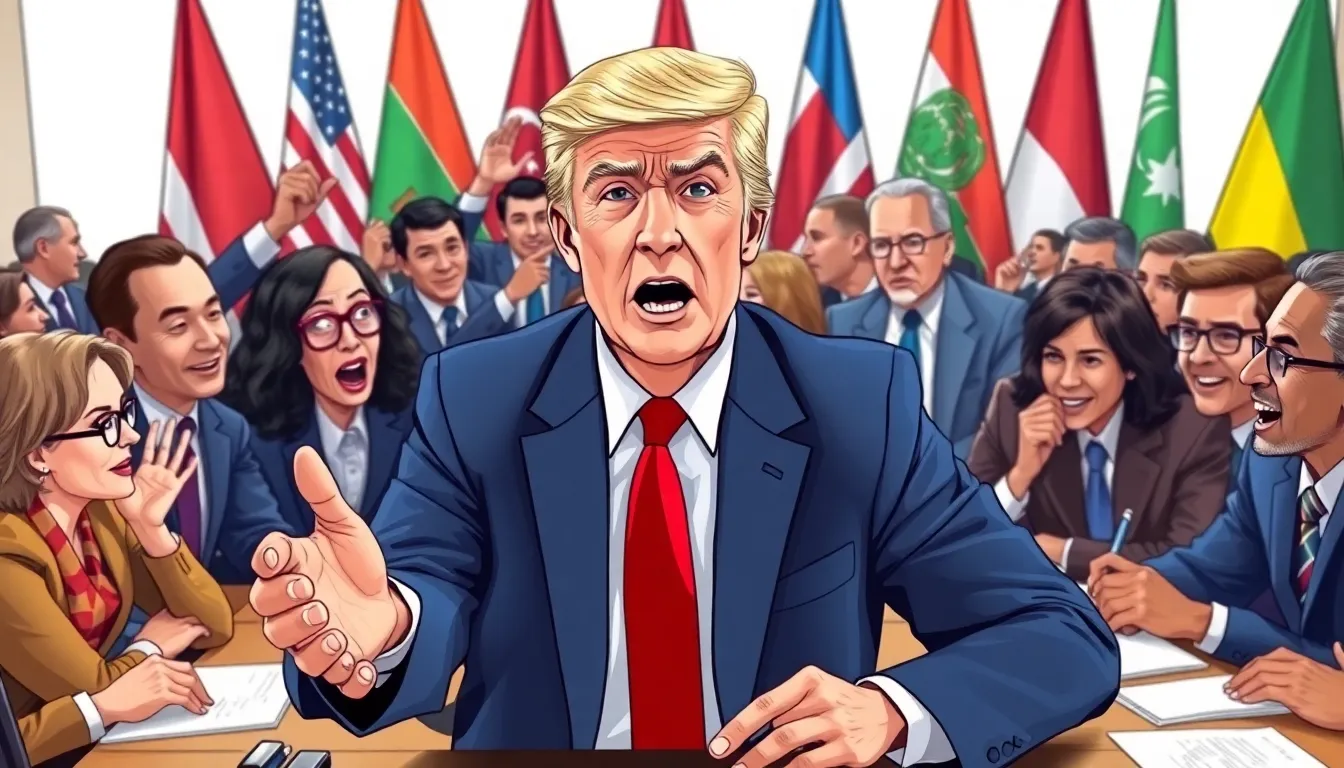In an increasingly interconnected world, global affairs shape the way nations interact, collaborate, and occasionally bicker like siblings over the last slice of pizza. From trade agreements to climate change negotiations, understanding global affairs is essential for anyone who wants to stay informed and engaged in today’s dynamic landscape.
Table of Contents
ToggleUnderstanding Global Affairs
Understanding global affairs involves recognizing the complex interactions between countries. These interactions shape political, economic, and social dynamics worldwide.
Definition of Global Affairs
Global affairs encompass the study of international relationships. This field examines diplomacy, conflict resolution, and global cooperation. It includes actors such as governments, international organizations, and non-governmental organizations. Studying this area involves looking at events that affect multiple nations. Topics include trade agreements, environmental issues, and security concerns. Ultimately, global affairs highlight how interconnected today’s world really is.
Importance of Global Affairs
Global affairs play a vital role in shaping policies. They influence how countries address issues like climate change and public health. Understanding this field enhances citizens’ awareness of international news. Engaging with global affairs empowers individuals to participate in discussions. Awareness of different cultures and perspectives fosters mutual respect and cooperation. In addition, informed citizens contribute to the democratic process. Consequently, awareness of global dynamics nourishes informed decision-making both locally and globally.
Key Components of Global Affairs
Global affairs encompass various components that shape international relationships. Understanding these components offers valuable insights into how countries interact on vital issues.
Political Factors
Political factors play a significant role in shaping global affairs. Diplomacy serves as a primary tool for nations to engage and resolve conflicts. International organizations, such as the United Nations, facilitate cooperation among countries, encouraging dialogue and negotiation. Decisions made at national and global levels often reflect political ideologies, impacting international relations. Regional conflicts can also arise, influencing global stability. Policies enacted by governments regarding foreign relations directly affect trade agreements and alliances. Elected leaders and their strategic agendas shape how nations respond to global challenges.
Economic Factors
Economic factors have a profound impact on global affairs. Trade agreements between countries foster economic ties and promote mutual growth. Economic stability within nations influences their global standing and negotiating power. Globalization has led to increased interdependence, with supply chains spanning multiple countries. This interconnectedness can drive both economic cooperation and competition. Currency fluctuations, inflation rates, and tariffs significantly affect international trade dynamics. Economic sanctions may serve as tools for political leverage, altering how countries engage with one another.
Social Factors
Social factors contribute to the complexity of global affairs. Cultural exchange between nations enhances mutual understanding and collaboration. Migration patterns reflect social dynamics, with people moving for opportunities or safety. Global communication technologies enable the rapid spread of information and cultural trends, fostering global citizenship. Social movements advocating for human rights, environmental protection, and other issues often cross borders, uniting diverse populations. Education systems worldwide play a crucial role in shaping perspectives on global matters, influencing future generations’ views on international cooperation.
The Role of International Organizations
International organizations play a critical role in global affairs by fostering cooperation among nations. They serve as platforms for dialogue, collaboration, and conflict resolution.
United Nations
The United Nations (UN) tackles a broad range of global challenges, from peacekeeping to human rights advocacy. Comprising 193 member states, it promotes international cooperation to solve issues like poverty and health crises. Specialized agencies work under the UN umbrella, such as the World Health Organization and UNESCO, addressing specific needs. Policies and resolutions reflect collective priorities that drive global progress. The UN’s peacekeeping missions often attempt to restore stability in conflict zones, demonstrating its commitment to peace.
World Trade Organization
The World Trade Organization (WTO) regulates international trade and promotes fair competition. Established in 1995, it has 164 member countries. Through trade agreements, the WTO aims to reduce tariffs and eliminate trade barriers, facilitating smoother transactions among nations. Dispute resolution mechanisms allow member countries to address grievances effectively. Economic stability hinges on the WTO’s efforts to ensure that global trade operates fairly, supporting economic growth and development across the world.
Current Trends in Global Affairs
Global affairs continuously evolve in response to pressing issues. Two critical areas currently shaping diplomatic discussions include climate change and migration.
Climate Change
Climate change represents a significant global challenge facing every nation. Rising temperatures and extreme weather events have prompted international agreements such as the Paris Agreement, which aims to limit global warming to 1.5 degrees Celsius. Nations must collaborate on reducing greenhouse gas emissions while transitioning to renewable energy sources. Moreover, addressing climate-related displacement requires investment in adaptive infrastructure and technology. Countries like Germany and Canada showcase leadership in sustainable practices, appealing to global partners for similar commitments. The urgent nature of climate change drives conversations in international forums, emphasizing shared responsibility and collective action.
Migration and Displacement
Migration and displacement patterns shift due to conflicts and environmental changes. In 2023, over 26 million people are refugees, fleeing violence, persecution, and disasters. Countries facing large influxes of migrants must balance humanitarian obligations and domestic concerns. The Global Compact for Migration suggests approaches to ensure safe, orderly, and regular migration. Nations like Jordan and Turkey exemplify resilience by hosting significant numbers of refugees. Increasingly, discussions around migration address integration policies, emphasizing social cohesion and economic participation. Collaborative efforts are essential to manage challenges associated with migration and ensure refugees’ rights and dignity.
Understanding global affairs is essential for navigating today’s complex world. It fosters informed citizens who can engage in meaningful discussions about pressing issues. As nations face challenges like climate change and migration, the need for cooperation and collaboration becomes increasingly clear.
By recognizing the interconnectedness of political, economic, and social factors, individuals can appreciate the nuances of international relationships. Embracing this knowledge not only enriches personal perspectives but also empowers communities to contribute to global solutions. Ultimately, staying informed about global affairs is a vital step toward creating a more cohesive and responsive society.




